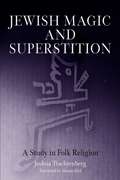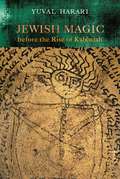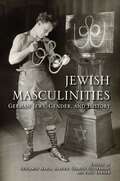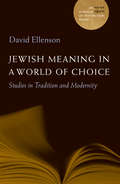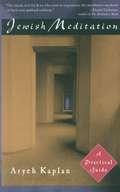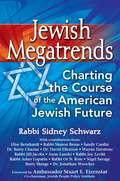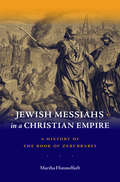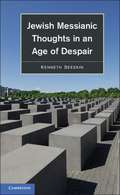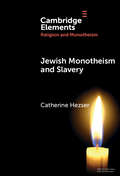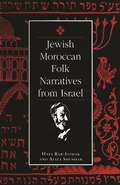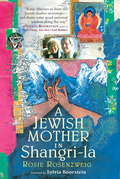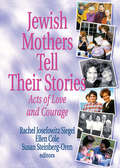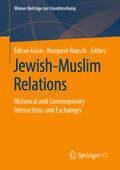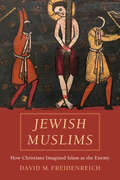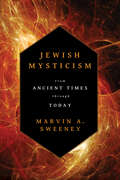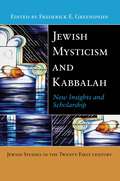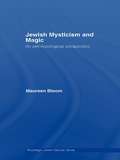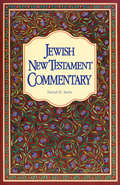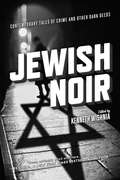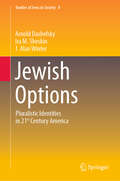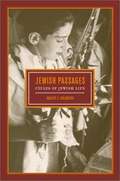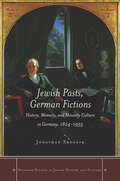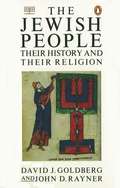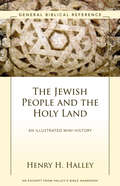- Table View
- List View
Jewish Mad Men: Advertising and the Design of the American Jewish Experience
by Professor Kerri P. SteinbergIt is easy to dismiss advertising as simply the background chatter of modern life, often annoying, sometimes hilarious, and ultimately meaningless. But Kerri P. Steinberg argues that a careful study of the history of advertising can reveal a wealth of insight into a culture. In Jewish Mad Men, Steinberg looks specifically at how advertising helped shape the evolution of American Jewish life and culture over the past one hundred years. Drawing on case studies of famous advertising campaigns--from Levy's Rye Bread ("You don't have to be Jewish to love Levy's") to Hebrew National hot dogs ("We answer to a higher authority")--Steinberg examines advertisements from the late nineteenth-century in New York, the center of advertising in the United States, to trace changes in Jewish life there and across the entire country. She looks at ads aimed at the immigrant population, at suburbanites in midcentury, and at hipster and post-denominational Jews today. In addition to discussing campaigns for everything from Manischewitz wine to matzoh, Jewish Mad Men also portrays the legendary Jewish figures in advertising--like Albert Lasker and Bill Bernbach--and lesser known "Mad Men" like Joseph Jacobs, whose pioneering agency created the brilliantly successful Maxwell House Coffee Haggadah. Throughout, Steinberg uses the lens of advertising to illuminate the Jewish trajectory from outsider to insider, and the related arc of immigration, acculturation, upward mobility, and suburbanization.Anchored in the illustrations, photographs, jingles, and taglines of advertising, Jewish Mad Men features a dozen color advertisements and many black-and-white images. Lively and insightful, this book offers a unique look at both advertising and Jewish life in the United States.
Jewish Magic and Superstition
by Moshe Idel Joshua TrachtenbergAlongside the formal development of Judaism from the eleventh through the sixteenth centuries, a robust Jewish folk religion flourished--ideas and practices that never met with wholehearted approval by religious leaders yet enjoyed such wide popularity that they could not be altogether excluded from the religion. According to Joshua Trachtenberg, it is not possible truly to understand the experience and history of the Jewish people without attempting to recover their folklife and beliefs from centuries past.Jewish Magic and Superstition is a masterful and utterly fascinating exploration of religious forms that have all but disappeared yet persist in the imagination. The volume begins with legends of Jewish sorcery and proceeds to discuss beliefs about the evil eye, spirits of the dead, powers of good, the famous legend of the golem, procedures for casting spells, the use of gems and amulets, how to battle spirits, the ritual of circumcision, herbal folk remedies, fortune telling, astrology, and the interpretation of dreams.First published more than sixty years ago, Trachtenberg's study remains the foundational scholarship on magical practices in the Jewish world and offers an understanding of folk beliefs that expressed most eloquently the everyday religion of the Jewish people.
Jewish Magic before the Rise of Kabbalah (Raphael Patai Series in Jewish Folklore and Anthropology)
by Yuval Harari“Magic culture is certainly fascinating. But what is it? What, in fact, are magic writings, magic artifacts?” Originally published in Hebrew in 2010, Jewish Magic Before the Rise of Kabbalah is a comprehensive study of early Jewish magic focusing on three major topics: Jewish magic inventiveness, the conflict with the culture it reflects, and the scientific study of both. The first part of the book analyzes the essence of magic in general and Jewish magic in particular. The book begins with theories addressing the relationship of magic and religion in fields like comparative study of religion, sociology of religion, history, and cultural anthropology, and considers the implications of the paradigm shift in the interdisciplinary understanding of magic for the study of Jewish magic. The second part of the book focuses on Jewish magic culture in late antiquity and in the early Islamic period. This section highlights the artifacts left behind by the magic practitioners—amulets, bowls, precious stones, and human skulls—as well as manuals that include hundreds of recipes. Jewish Magic before the Rise of Kabbalah also reports on the culture that is reflected in the magic evidence from the perspective of external non-magic contemporary Jewish sources. Issues of magic and religion, magical mysticism, and magic and social power are dealt with in length in this thorough investigation. Scholars interested in early Jewish history and comparative religions will find great value in this text.
Jewish Masculinities: German Jews, Gender, and History
by Benjamin Maria Baader, Sharon Gillerman, and Paul LernerStudies exploring the history of the German-Jewish male identity from the sixteenth to twentieth centuries, across a myriad of societal occupations.Stereotyped as delicate and feeble intellectuals, Jewish men in German-speaking lands in fact developed a rich and complex spectrum of male norms, models, and behaviors. Jewish Masculinities explores conceptions and experiences of masculinity among Jews in Germany from the sixteenth through the late twentieth century as well as emigrants to North America, Palestine, and Israel. The volume examines the different worlds of students, businessmen, mohels, ritual slaughterers, rabbis, performers, and others, shedding new light on the challenge for Jewish men of balancing German citizenship and cultural affiliation with Jewish communal solidarity, religious practice, and identity.“A valuable addition to the growing field of Jewish gender history.” —Derek Penslar, University of Toronto“[This book] assembles innovative, vivid, and inspiring inquiries into the intersection of Jewish history, German history, and gender history. By focusing on the male side of Jewish gender history . . . [this] book establishes a new field, profiting from a broad range of never (or rarely) before used primary sources, such as memoirs, letters, interviews, and obscure tabloids.” —German Studies Review, May 2014“[A]n excellent introduction to the Zionist remasculinization of the Jewish male.” —H-Judaic, February 2015“[I]nsightful, innovative and largely entertaining. . . . [T]his volume makes a very valuable and original contribution to German-Jewish history.” —German History“Historians of central Europe will be enriched by the interrogations of “theory” along with excavations of little-known yet critical avenues of Jewish history in this excellent volume.” —Central European History
Jewish Meaning in a World of Choice: Studies in Tradition and Modernity (A JPS Scholar of Distinction Book #9)
by Rabbi David EllensonInternationally recognized scholar David Ellenson shares twenty-three of his most representative essays, drawing on three decades of scholarship and demonstrating the consistency of the intellectual-religious interests that have animated him throughout his lifetime. These essays center on a description and examination of the complex push and pull between Jewish tradition and Western culture. Ellenson addresses gender equality, women’s rights, conversion, issues relating to who is a Jew, the future of the rabbinate, Jewish day schools, and other emerging trends in American Jewish life. As an outspoken advocate for a strong Israel that is faithful to the democratic and Jewish values that informed its founders, he also writes about religious tolerance and pluralism in the Jewish state. The former president of Hebrew Union College–Jewish Institute of Religion, the primary seminary of the Reform movement, Ellenson is widely respected for his vision of advancing Jewish unity and of preparing leadership for a contemporary Judaism that balances tradition with the demands of a changing world. Scholars and students of Jewish religious thought, ethics, and modern Jewish history will welcome this erudite collection by one of today’s great Jewish leaders.
Jewish Meditation: A Practical Guide
by Aryeh KaplanStudents of mediation are usually surprised to discover that a Jewish mediation tradition exists and that it was an authentic and integral part of mainstream Judaism until the eighteenth century. Jewish Meditation is a step-by-step introduction to meditation and the Jewish practice of meditation in particular. This practical guide covers such topics as mantra meditation, contemplation, and visualization within a Jewish context. It shows us how to use meditative techniques to enhance prayer using the traditional liturgy--the Amidah and the Shema. Through simple exercises and clear explanations of theory, Rabbi Kaplan gives us the tools to develop our spiritual potential through an authentically Jewish meditative practice.
Jewish Megatrends: Charting the Course of the American Jewish Future
by Rabbi Sidney SchwarzThe American Jewish community is riddled with doubts about the viability of the institutions that well served the Jewish community of the twentieth century. Synagogues, Federations and Jewish membership organizations have yet to figure out how to meet the changing interests and needs of the next generation.
Jewish Messiahs in a Christian Empire: A History of the Book of Zerubbabel
by Martha HimmelfarbThe seventh-century CE Hebrew work Sefer Zerubbabel (Book of Zerubbabel)—a tale of two messiahs—is the first full-fledged messianic narrative in Jewish literature. Martha Himmelfarb offers a comprehensive analysis of this rich understudied text, illuminating its distinctive literary features and the complex milieu from which it arose.
Jewish Messianic Thoughts in an Age of Despair
by Kenneth SeeskinBelief in the coming of a Messiah poses a genuine dilemma. From a Jewish perspective, the historical record is overwhelmingly against it. If, despite all the tragedies that have befallen the Jewish people, no legitimate Messiah has come forward, has the belief not been shown to be groundless? Yet for all the problems associated with messianism, the historical record also shows it is an idea with enormous staying power. The prayer book mentions it on page after page. The great Jewish philosophers all wrote about it. Secular thinkers in the twentieth century returned to it and reformulated it. And victims of the Holocaust invoked it in the last few minutes of their life. This book examines the staying power of messianism and formulates it in a way that retains its redemptive force without succumbing to mythology.
Jewish Monotheism and Slavery (Elements in Religion and Monotheism)
by Catherine HezserBiblical monotheism imagines God as a slave master who owns and has total control over humans as his slaves, who are expected to show obedience to him. The theological use of slavery metaphors has a limited value, however, and is deeply problematic from the perspective of real-life slave practices. Ancient authors already supplemented the metaphor of God as a slave master with other images and emphasized God's difference from human slave owners. Ancient and modern experiences of and attitudes toward slavery determined the understanding and applicability of the slavery metaphors. This Element examines the use of slavery metaphors in ancient Judaism and Christianity in the context of the social reality of slavery, modern abolitionism, and historical-critical approaches to the ancient texts.
Jewish Moroccan Folk Narratives from Israel (Raphael Patai Series in Jewish Folklore and Anthropology)
by Haya Bar-Itzhak Aliza ShenharJewish Moroccan Folk Narratives focuses on two central elements: textual research to examine the aesthetic qualities of the narrative, their division into genres, the various versions and their parallels, and acculturation in Israel, as well as contextual research to examine the performance art of the narrator and the role of the narrative as a communicative process in the narrating society. The collection includes twenty-one narratives by twelve storytellers; an account of the narrators' lives and a commentary have been applied to each. In contrast to most anthologies of Jewish folktales, the texts in this book were recorded in the natural context of narration and in the language of origin (Judaeo-Arabic), meeting the most vigorous standards of current folklore scholarship.
A Jewish Mother in Shangri-la
by Rosie RosenzweigAn old joke tells of a Jewish woman who treks to the Himalayas to seek an audience with a guru sitting in seclusion on a mountaintop. When at last she comes before him, she implores: "Sheldon, come home!" Rosie Rosenzweig became that Jewish mother--but in real life, the story has a different ending. Instead of asking her Buddhist son, Ben, to come home, Rosie accepts his invitation to find out about Buddhism firsthand. Together they visit retreat centers in Europe and Asia and meet leading meditation masters who are Ben's gurus: Vietnamese teacher Thich Nhat Hanh and Tibetan lamas Tulku Urgyen Rinpoche and Chökyi Nyima Rinpoche. While struggling to come to terms with Ben's choice of a spiritual path so different from everything that she cherishes, Rosie finds that she is learning more about herself than she anticipated. The adventures of Rosie recounts take her from her Boston suburb to a Zen hermitage in France, an enclave of Tibetan Buddhists in Nepal, and finally to her own spiritual home in Jerusalem. Whether she is practicing mindfulness meditation, sharing a cup of tea with a Zen master, or worrying about bowing down to idols, Rosie is intent in her quest to find common ground between two ancient traditions, to deepen her understanding of her son, and to find a way to her own authentic experience of truth. Hers is a mission of peace that seeks to build a bridge of understanding between cultures and faiths while remaining true to her own Jewish identity.
Jewish Mothers Tell Their Stories: Acts of Love and Courage
by Ellen Cole Rachel J Siegel Susan Steinberg OrenWinner of the Women in Psychology Jewish Caucus Award for 2000!Jewish Mothers Tell Their Stories: Acts of Love and Courage contains touching and personal essays written by contemporary Jewish mothers from different parts of the globe. Their stories reveal the choices that Jewish mothers make in our post-Holocaust, non-Jewish world--the many ways of being Jewish, the acts of loving, of preserving and celebrating Jewish traditions and spirituality, and of transmitting them to their children and families. The firsthand stories in this compelling book raises questions and provides you with insight into a variety of topics, including: The 'Jewish mother’stereotype and its impact on real Jewish mothers ethnic/historical connections between mothers and daughters moving acts of love, courage, and sacrifice in response to illness, war, or conflicting ideologies motherhood as a catalyst for personal evolutions of Jewish identity and values Orthodox to secular expressions of spirituality The impact of the 'Jewish motherhood imperative’ positive experiences of conversion and interfaith families conveying Jewish history and tradition in a Christian worldJewish Mothers Tell Their Stories will draw you into an appreciation of the cultural, ethnic, and spiritual aspects of mothering. This remarkable collection explores the different meanings of today's concept of “Jewish mother” and “Jewish family.”
Jewish-Muslim Relations: Historical and Contemporary Interactions and Exchanges (Wiener Beiträge zur Islamforschung)
by Ednan Aslan Margaret RauschThis multidisciplinary volume unites research on diverse aspects of Jewish-Muslim relations, exchanges and coexistence across time including the Abrahamic tradition enigma, Jews in the Qur’an and Hadith, Ibn al-‘Arabi and the Kabala, comparative feminist theology, Jews, Christians, Muslims and the Gospel of Barnabas, harmonizing religion and philosophy in Andalusia, Jews and Muslims in medieval Christian Spain, Israeli Jews and Muslim and Christian Arabs, Jewish-Muslim coexistence on Cyprus, Muslim-Jewish dialogues in Berlin and Barcelona, Jewish-Christian-Muslim trialogues and teleology, Jewish and Muslim dietary laws, and Jewish and Muslim integration in Switzerland and Germany.
Jewish Muslims: How Christians Imagined Islam as the Enemy
by David M. FreidenreichUncovering the hidden history of Islamophobia and its surprising connections to the long-standing hatred of Jews. Hatred of Jews and hatred of Muslims have been intertwined in Christian thought since the rise of Islam. In Jewish Muslims, David M. Freidenreich explores the history of this complex, perplexing, and emotionally fraught phenomenon. He makes the compelling case that, then and now, hate-mongers target "them" in an effort to define "us." Analyzing anti-Muslim sentiment in texts and images produced across Europe and the Middle East over a thousand years, the author shows how Christians intentionally distorted reality by alleging that Muslims were just like Jews. They did so not only to justify assaults against Muslims on theological grounds but also to motivate fellow believers to live as "good" Christians. The disdain premodern polemicists expressed for Islam and Judaism was never really about these religions. Rather, they sought to promote their own visions of Christianity—a dynamic that similarly animates portrayals of Muslims and Jews today.
Jewish Mysticism: From Ancient Times through Today
by Marvin A. SweeneyQuestions of how the divine presence is understood and interacts within the world have been around since the time of the biblical prophets. The Jewish mystical tradition conceives God as active, just, powerful, and present while allowing for divine limitation so as to understand the relationship between G-d and the Jewish people in their history. Jewish Mysticism surveys Jewish visionary and mystical experience from biblical and ancient Near Eastern times through the modern period and the emergence of modern Hasidism. Marvin Sweeney provides a comprehensive treatment of one of the most dynamic fields of Jewish studies in the twenty-first century, providing an accessible overview of texts and interpretative issues. Sweeney begins with the biblical period, which most treatments of Jewish mysticism avoid, and includes chapters on the ancient Near East, the Pentateuch, the Former Prophets and Psalms, the Latter Prophets, Jewish Apocalyptic, the Heikhalot Literature, the Sefer Yetzirah and early Kabbalistic Literature, the Zohar, Lurianic Kabbalah and the Shabbetean Movement, and the Hasidic Movement. Placing Jewish apocalyptic literature into the larger development of ancient Jewish visionary and mystical experience, Sweeney fills gaps left by the important but outdated work of others in the field. Ideal for the scholar, student, or general reader, Jewish Mysticism provides readers with a fresh understanding of the particular challenges, problems, needs, and perspectives of Judaism throughout its history.
Jewish Mysticism and Kabbalah: New Insights and Scholarship (Jewish Studies in the 21st Century #2)
by Frederick E GreenspahnInformative and accessible essays exploring contemporary scholarship in Jewish mysticism and Kabbalah.“This carefully edited collection of essays on Jewish mysticism effectively delivers on its promise to be accessible to broad audiences. The volume amounts to a thoughtful and lucid conversation among leading scholars. . . . The literate lay reader as well as faculty and students in a wide range of university courses will find this to be a most useful gateway to Jewish mysticism as well as an illumining account of current trends in scholarship.” —Jeremy Zwelling, Wesleyan UniversityOver the past generation, scholars have devoted increasing attention to the diverse forms that Jewish mysticism has taken both in the past and today: what was once called “nonsense” by Jewish scholars has generated important research and attention both within the academy and beyond, as demonstrated by the popular fascination with figures such as Madonna and Demi Moore and the growing interest in spirituality.In Jewish Mysticism and Kabbalah, leading experts introduce the history of this scholarship as well as the most recent insights and debates that currently animate the field in a way that is accessible to a broad audience. From mystical outpourings in ancient Palestine to the Kabbalah Centre, and from attitudes towards gender to mystical contributions to Jewish messianic movements, this volume explores the various expressions of Jewish mysticism from antiquity to the present day in an engaging style appropriate for students and non-specialists alike.“Refreshingly summarizes much of the current thinking about mysticism in general and Kabbalah in particular. The essays are thoughtful, provocative, and frequently even inspiring.” —Lawrence Kushner, author of I’m God, You’re Not“This is an excellent book for general readers who wish to learn about this fascinating area of Jewish life and literature, as the jargon of scholar-speak is kept to a minimum.” —Jewish Book Council
Jewish Mysticism and Magic: An Anthropological Perspective (Routledge Jewish Studies Series)
by Maureen BloomProviding a unique anthropological perspective on Jewish mysticism and magic, this book is a study of Jewish rites and rituals and how the analysis of early literature provides the roots for understanding religious practices. It includes analysis on the importance of sacrifice, amulets, and names, and their underlying cultural constructs and the persistence of their symbolic significance.
Jewish New Testament Commentary: A Companion Volume To The Jewish New Testament
by David H. SternDrawing on years of research, Dr. Stern relates the New Testament text to the Tanakh (Old Testament), to the historical setting, to rabbinic materials and Christian theology. He answers questions Jewish people have about Yeshua, the New Testament, and Christianity; questions Christians have about Judaism and the Jewish roots of their faith; and questions Messianic Jews have about being both Jewish and Messianic.
Jewish Noir: Contemporary Tales of Crime and Other Dark Deeds
by Kenneth WishniaA unique collection of all-new stories by award-winning authors. This anthology includes the work of numerous authors such as Marge Piercy, Harlan Ellison, S. J. Rozan, Nancy Richler, Moe Prager (Reed Farrel Coleman), Wendy Hornsby, Charles Ardai, and Kenneth Wishnia. The stories explore such issues as the Holocaust and its long-term effects on subsequent generations, anti-Semitism in the mid- and late-20th-century United States, and the dark side of the Diaspora (e.g., the decline of revolutionary fervor, the passing of generations, the Golden Ghetto, etc.). The stories in this collection include "Trajectories," Marge Piercy's story of the divergent paths taken by two young men from the slums of Cleveland and Detroit in a rapidly changing post–WW II society; "Some You Lose," Nancy Richler's empathetic exploration of the emotional and psychological challenges of trying to sum up a man's life in a eulogy; and "Yahrzeit Candle," Stephen Jay Schwartz's take on the subtle horrors of the inevitable passing of time. These works include many "teachable moments" about the history of prejudice, the contradictions of ethnic identity, and assimilation into American society and culture.
Jewish Options: Pluralistic Identities in 21st Century America (Studies of Jews in Society #8)
by Arnold Dashefsky Ira M. Sheskin J.Alan WinterThis book offers an examination of an expanding set of options for being Jewish in contemporary American society. It examines the evolution of Jewish identity across five epochs of Jewish civilization as well as the transformation of the American Jewish experience across four centuries. In addition, an institutional history and a geographic, demographic, and religious profile of American Jews are presented, including an outline of contemporary Jewish options to express Jewish identity in twenty-first century America. Readers will gain an understanding of how these options developed via the provision of a socio-historical and a social scientific analysis of each option in one integrated volume. The book also discusses contemporary challenges to the continuity of American Jewish community and identity including the issues of education, interfaith marriage, and philanthropy.
Jewish Passages: Cycles of Jewish Life
by Harvey E. GoldbergThis book is both comprehensive and accessible, making Jewish customs meaningful even to non-specialists. A scholarly achievement with tremendous value for anyone in Jewish Studies including rabbis and members of synagogue study groups.
Jewish Pasts, German Fictions: History, Memory, and Minority Culture in Germany, 1824-1955
by Jonathan SkolnikJewish Pasts, German Fictions is the first comprehensive study of how German-Jewish writers used images from the Spanish-Jewish past to define their place in German culture and society. Jonathan Skolnik argues that Jewish historical fiction was a form of cultural memory that functioned as a parallel to the modern, demythologizing project of secular Jewish history writing. What did it imply for a minority to imagine its history in the majority language? Skolnik makes the case that the answer lies in the creation of a German-Jewish minority culture in which historical fiction played a central role. After Hitler's rise to power in 1933, Jewish writers and artists, both in Nazi Germany and in exile, employed images from the Sephardic past to grapple with the nature of fascism, the predicament of exile, and the destruction of European Jewry in the Holocaust. The book goes on to show that this past not only helped Jews to make sense of the nonsense, but served also as a window into the hopes for integration and fears about assimilation that preoccupied German-Jewish writers throughout most of the nineteenth century. Ultimately, Skolnik positions the Jewish embrace of German culture not as an act of assimilation but rather a reinvention of Jewish identity and historical memory.
The Jewish People: Their History and Their Religion
by David Goldberg John RaynerThe first part of this illustrated volume offers a survey of Jewish history and literature. The second part presents what the preface describes as "a thematic analysis of the teachings and practice of Judaism".
The Jewish People and the Holy Land: A Zondervan Digital Short
by Henry H. HalleyDerived from Halley’s Bible Handbook, a world-renowned, accessible guide to the Bible now in its 25th edition, this digital short sketches the history of the Jewish people in the Holy Land from the time of Jesus until the present day. Useful for students of the Bible and church history, The Jewish People and the Holy Land will also fascinate readers wanting to better understand the historic roots of the modern state of Israel.

